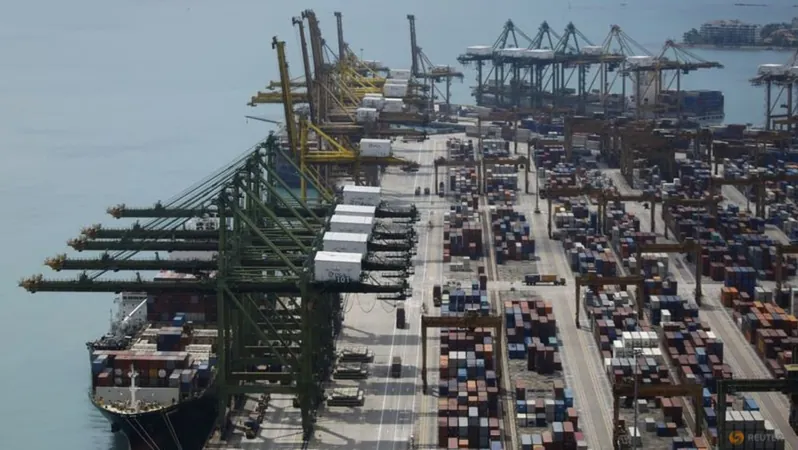
Singapore's Exports Surge Despite Slowing Growth: What You Need to Know!
2025-04-17
Author: Rajesh
Singapore's Export Performance: A Mixed Bag
In March, Singapore's non-oil domestic exports (NODX) saw a notable rise of 5.4%, although this marks a deceleration from the impressive 7.6% growth reported in February. While data released by Enterprise Singapore shows positive trends, experts warn that the growth rate fell short of the anticipated 14.1% predicted by a Reuters poll.
Electronics Shine While Non-Electronics Slow
Both electronics and non-electronic exports contributed to this growth, but not without variations. Electronics saw an impressive year-on-year increase of 11.9%, buoyed by particularly strong performances in personal computers, disk media, and integrated circuits, which shot up by 121.4%, 35.7%, and 6.5% respectively. In contrast, non-electronic exports experienced a more muted growth of 3.8%, down from 7.7% in the previous month.
Global Trade Dynamics and Trade War Effects
In the backdrop, the ongoing global trade tensions, especially between the US and China, loom large over Singapore's export landscape. US President Donald Trump's recent tariffs are causing ripples across trade markets, with Singapore facing a potential baseline 10% tariff due to the zero tariffs currently in place. Although there has been a temporary halt on increased tariffs for 90 days, the shadow of uncertainty continues to impact Singapore's economy.
Future Forecasts: Cautious Optimism Amidst Challenges
The Monetary Authority of Singapore has adjusted its GDP growth forecast for 2025 to a cautious 0% to 2%, reflecting the anticipated impacts of these tariffs on global trade. Notably, the Ministry of Trade and Industry has indicated that the prevailing tariffs could significantly dampen both global trade and economic growth, affecting Singapore's position in the regional supply chain.
The Human Element: Job Market Implications Ahead
Economists are foreseeing potential fallout in the job market, with Prime Minister Lawrence Wong cautioning that slower economic growth could lead to diminished job opportunities and wage growth. He highlighted concerns that some companies might even relocate their operations back to the US, risking higher retrenchments and job losses.
Conclusion: A Shifting Landscape for Global Trade
As Singapore navigates this challenging economic environment, it faces the reality that the landscape of globalisation and free trade is shifting. Analysts, including OCBC's chief economist Selena Ling, underscore that these developments could have significant repercussions for Singapore's role as a regional trade hub. The future remains uncertain, but one thing is clear: the impact of tariffs and trade negotiations will resonate in Singapore for the foreseeable future.




 Brasil (PT)
Brasil (PT)
 Canada (EN)
Canada (EN)
 Chile (ES)
Chile (ES)
 Česko (CS)
Česko (CS)
 대한민국 (KO)
대한민국 (KO)
 España (ES)
España (ES)
 France (FR)
France (FR)
 Hong Kong (EN)
Hong Kong (EN)
 Italia (IT)
Italia (IT)
 日本 (JA)
日本 (JA)
 Magyarország (HU)
Magyarország (HU)
 Norge (NO)
Norge (NO)
 Polska (PL)
Polska (PL)
 Schweiz (DE)
Schweiz (DE)
 Singapore (EN)
Singapore (EN)
 Sverige (SV)
Sverige (SV)
 Suomi (FI)
Suomi (FI)
 Türkiye (TR)
Türkiye (TR)
 الإمارات العربية المتحدة (AR)
الإمارات العربية المتحدة (AR)